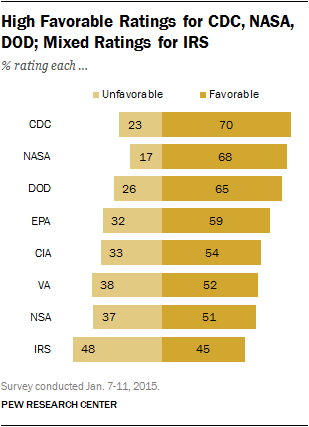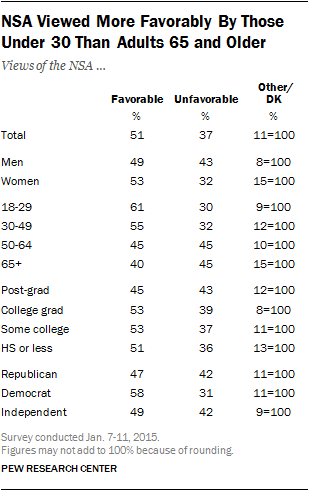Americans' Political Opinions Are Even More Confusing Than You Thought
By:
.jpg?auto=format&crop=faces&fit=crop&q=60&w=736&ixlib=js-1.1.0)
Although people say they distrust government, their answer changes when you ask them about individual government agencies.
Pew asked Americans about eight different agencies:
- CIA
- FBI
- NSA
- NASA
- IRS
- Department of Defense (DOD)
- Environmental Protection Agency (EPA)
- Department of Veterans Affairs (VA)
Except for one, each came back with the majority of respondents having a favorable opinion.
Can you guess the one agency people don't like?
Waiting...
Yep, only 48 percent have a favorable opinion of the IRS. (But even that seems high!) And, while the VA still has a 52 percent favorability rating, it's dropped by 16 points in the wake of revelations that the agency was mishandling healthcare for veterans, a scandal that led to the resignation of VA Secretary Eric Shinseki.

As Pew points out, this data contradicts a survey it took earlier this year that found just 24 percent of people trusted Washington to do the right thing most or all of the time. It's reminiscent of data that has consistently shown deep disapproval of Congress even though most people like the individual who is representing them in Congress.
Millennials had some surprising answers
After Edward Snowden leaked information about the NSA's extensive surveillance activities, there was a notion that young people -- who grew up on the internet -- felt betrayed by President Obama, who, as chief executive, is responsible for national security issues. Surely, there are many Millennials who ardently believe in online privacy and limited government surveillance. Pew, however, dumps some cold water on the narrative that this view is ubiquitous among Millennials. Their study says that Millennials actually like the NSA. In fact, the NSA's 61 percent favorability rating from 18-29 year-old's is the highest among any age group.

Why might this be?
One idea is that young people, generally, do not have high expectations for online privacy. They are more comfortable with the notion that the government is mining data because they know that social media companies and major consumer brands are doing the same thing. But who knows?
Regardless, as we have reported, as young people take over leadership roles in politics in business, they will influence our priorities on privacy.
Party Affiliation Matters
Republicans have more negative feelings towards government agencies. They don't like the IRS at higher percentages than the rest of the public, and they also have unfavorable views of the VA, the NSA, and the EPA.
Fifty-four percent of Democrats, on the other hand, have an unfavorable view of the CIA. This is probably attributable to the disclosure of the CIA's use of torture and enhanced interrogation techniques against detainees suspected of terrorism.
The IRS is a huge sticking point between the parties. The tax-collection agency has a 60% favorability rating with Democrats and just a 30% favorability rating with Republicans.
